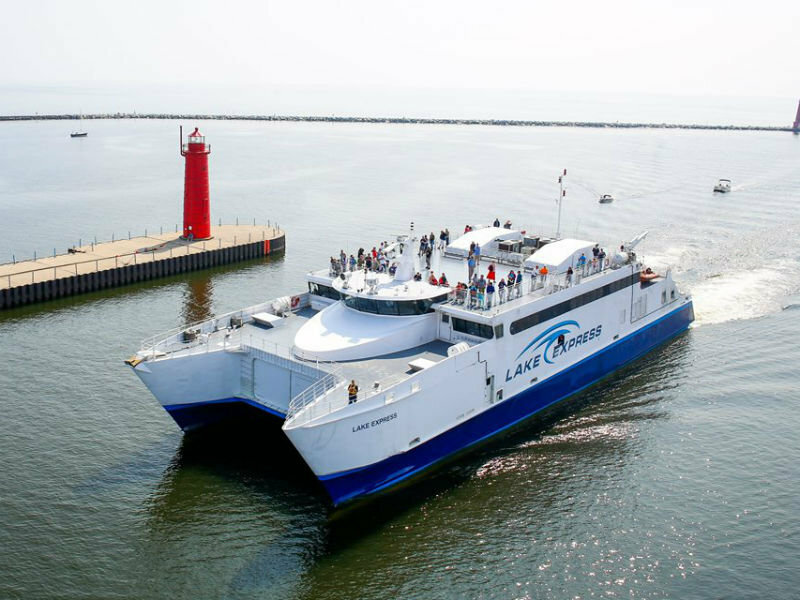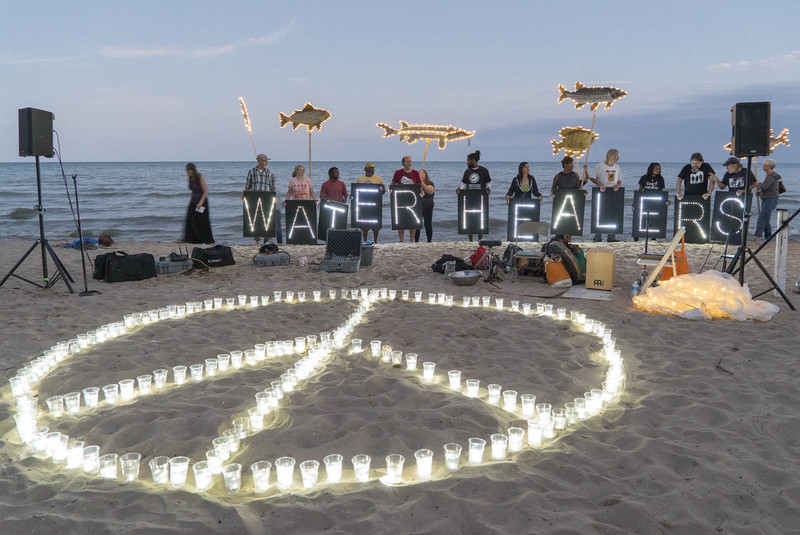Fans of Milwaukee – and Great Lakes – history who haven't signed up for the MKE Marine Reports mailing list are missing out. To join the list, send an email to wmhs59@gmail.com
The information typically comes from the archives of the Wisconsin Marine Historical Society – headquartered at Milwaukee Public Library, which I featured in this story a few years back – which is very active in collecting and archiving documents and photos and objects and also hosts numerous events each year.
The newsletter is an easy way to find a cool old photo in your inbox every week (sometimes more). And, because these folks are history buffs like the rest of us, there's always a story behind the photo.
Here is today's story from the MKE Marine Reports:
On June 1 2004, Lake Express ferry departed Milwaukee on her maiden voyage. She was the first high-speed ferry to enter service on the Great Lakes, beating out her larger cousin Spirit of Ontario I. Skeptics believed she would not survive because there was not enough business. But she has. And although her seventeenth season has been delayed by the Coronavirus Crisis, Lake Express should soon be skimming the waves, once again connecting Milwaukee and Muskegon.
Ferry service between Milwaukee and the west coast of Michigan began in December 1897. These first ferries carried railroad cars instead of automobiles. After World War 2, ferry operators began catering to the tourist trade. But railroad carferries were labor intensive and costly to operate. Service to Milwaukee ended in 1980.
Ferry service between Ludington and Milwaukee was revived during the summer of 1981. This service was not continued the following year. It was tried again during the summers of 1983 and 1984. But in April 1985, Michigan-Wisconsin Transportation announced it would not continue service to Milwaukee because of "disappointingly low patronage."
Service between Ludington and Manitowoc continued until November 1990. After they sat idle for a year, Michigan entrepreneur and philanthropist Charles Conrad purchased three of the old railroad carferries. Badger underwent a major overhaul and was refit to carry only passengers and vehicles. She reentered service between Ludington and Manitowoc and continues to sail each year from May to October.
As the twenty-first century dawned, a new breed of high-speed ferry powered by waterjets was proving viable overseas. Milwaukee businessman Sheldon Lubar concluded that high-speed service between Milwaukee and Muskegon would work. According to Lubar’s son David, it would provide "a fast, safe means of crossing Lake Michigan and avoiding the frustrating hassles of driving through the congestion of the Chicago metropolitan area."
Some were not so sure. Robert Manglitz, president of Lake Michigan Carferry, the Badger’s owner, claimed: "We believe there is only enough business for one ferry." This started a rivalry that, for the next several years, would have the two companies trading barbs over federal subsidies and coal ash.
Australian-based Austal Ships, a pioneer in jet powered ferries, designed Lake Express. She was constructed by Austal USA in Mobile, Alabama. The $18 million catamaran is 192 feet long and has a 58-foot beam. To save weight, her hull is made primarily of aluminum. She is propelled by four waterjets powered by four 3,000-horsepower diesel engines.
Unlike the old railroad carferrys that had thick steel hulls so they could operate year-round, the twin hulls of Lake Express are constructed from thin sheets of aluminum. Each hull is divided into six watertight compartments so they will retain buoyancy should something puncture its skin. Lake Express is not designed to operate in lake ice.
Completed in early 2004, sea trials in the Gulf of Mexico showed the vessel was "faster, quieter and smoother than expected." Ready for service, she traveled up the Atlantic Coast and through the St. Lawrence Seaway to her new home in Milwaukee.
Just after 7:30 in the morning on June 1, 2004, under sunny skies, Lake Express slipped away from her unfinished terminal in Milwaukee. Passengers enjoyed champagne and were entertained by a live band. This was her inaugural trip. When Lake Express arrived at Muskegon, the long-retired Milwaukee Clipper blasted its horn to welcome the newcomer.
Traveling at nearly 40 miles per hour, Lake Express covers the 80 miles between Milwaukee and Muskegon in two and one-half hours. She carries 248 passengers, 46 automobiles, and 12 motorcycles. That same trip by car is 280 miles and goes through Chicago
Lake Express typically runs with either a head wind or tail wind. In that case, the catamaran can easily handle waves up to twelve feet. But passenger comfort is paramount according to Aaron Schultz, senior vice president. In atypical wind conditions, the company will consider canceling if wave heights reach six to seven feet, depending on wave direction and period.
A second high-speed ferry entered service on the Great Lakes June 17, 2004. Spirit of Ontario I was substantially larger than Lake Express. Built by Austal in Australia, she carried 774 passengers and 238 automobiles across Lake Ontario at 50 miles per hour. She connected Rochester and Toronto, a distance of about 100 miles. By fall of 2004 her owners were bankrupt and service was suspended. Spirit of Ontario I was eventually sold and moved off Lakes.
Today, Lake Express is the only high-speed ferry working the Lakes. The company has reaffirmed its commitment to quality service. When she returned from Manitowoc’s Burger Boat in April 2019, it marked the end of a four-year program to upgrade and refurbish the sleek catamaran. This included hull maintenance, engine overhauls, upgraded controls in the command center, new interior surfaces, more comfortable seating, and a paint job.
The Coronavirus Crisis has delayed Lake Michigan's Fast Ferry Shortcut. But according to the website, Lake Express should open her 17th season on June 4. If all goes well, she will make two round trips daily for the first two weeks before adding a third during the summer season. A one-way ticket is $97.50 for an adult and $41 for children (5-17). Transporting an auto will cost $107. For more information visit: lake-express.com.
NOTES:
Lake Express was very similar to another high-speed catamaran built by Austal then operating on the Red Sea between ports in Egypt and Saudi Arabia. Conditions on the Red Sea were similar to those on Lake Michigan.
Presidential candidate John Kerry rode Lake Express to Milwaukee Aug. 2, 2004, as part of a two-week trek across the country. He would lose to George W. Bush that November.
Lake Express winters in the South Menomonee Canal near the Valley Power Plant. Because cooling water from the plant is discharged into the canal, it rarely freezes.
Born in Brooklyn, N.Y., where he lived until he was 17, Bobby received his BA-Mass Communications from UWM in 1989 and has lived in Walker's Point, Bay View, Enderis Park, South Milwaukee and on the East Side.
He has published three non-fiction books in Italy – including one about an event in Milwaukee history, which was published in the U.S. in autumn 2010. Four more books, all about Milwaukee, have been published by The History Press.
With his most recent band, The Yell Leaders, Bobby released four LPs and had a songs featured in episodes of TV's "Party of Five" and "Dawson's Creek," and films in Japan, South America and the U.S. The Yell Leaders were named the best unsigned band in their region by VH-1 as part of its Rock Across America 1998 Tour. Most recently, the band contributed tracks to a UK vinyl/CD tribute to the Redskins and collaborated on a track with Italian novelist Enrico Remmert.
He's produced three installments of the "OMCD" series of local music compilations for OnMilwaukee.com and in 2007 produced a CD of Italian music and poetry.
In 2005, he was awarded the City of Asti's (Italy) Journalism Prize for his work focusing on that area. He has also won awards from the Milwaukee Press Club.
He has be heard on 88Nine Radio Milwaukee talking about his "Urban Spelunking" series of stories, in that station's most popular podcast.







